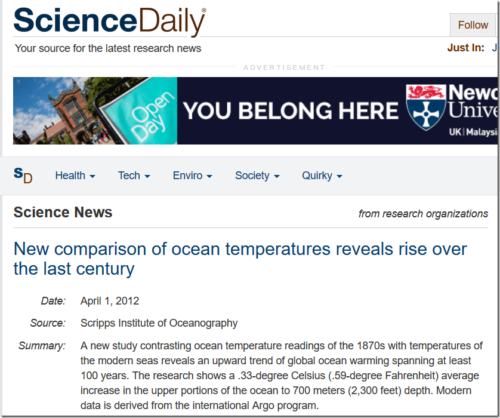This paper published in 2012 has much relevance to my post a couple of days ago about ocean temperatures:
A new study contrasting ocean temperature readings of the 1870s with temperatures of the modern seas reveals an upward trend of global ocean warming spanning at least 100 years.
The research led by Scripps Institution of Oceanography at UC San Diego physical oceanographer Dean Roemmich shows a .33-degree Celsius (.59-degree Fahrenheit) average increase in the upper portions of the ocean to 700 meters (2,300 feet) depth. The increase was largest at the ocean surface, .59-degree Celsius (1.1-degree Fahrenheit), decreasing to .12-degree Celsius (.22-degree Fahrenheit) at 900 meters (2,950 feet) depth.
The report is the first global comparison of temperature between the historic voyage of HMS Challenger (1872-1876) and modern data obtained by ocean-probing robots now continuously reporting temperatures via the global Argo program. Scientists have previously determined that nearly 90 percent of the excess heat added to Earth’s climate system since the 1960s has been stored in the oceans. The new study, published in the April 1 advance online edition of Nature Climate Change and coauthored by John Gould of the United Kingdom-based National Oceanography Centre and John Gilson of Scripps Oceanography, pushes the ocean warming trend back much earlier.
“The significance of the study is not only that we see a temperature difference that indicates warming on a global scale, but that the magnitude of the temperature change since the 1870s is twice that observed over the past 50 years,” said Roemmich, co-chairman of the International Argo Steering Team. “This implies that the time scale for the warming of the ocean is not just the last 50 years but at least the last 100 years.”
Although the Challenger data set covers only some 300 temperature soundings (measurements from the sea surface down to the deep ocean) around the world, the information sets a baseline for temperature change in the world’s oceans, which are now sampled continuously through Argo’s unprecedented global coverage. Nearly 3,500 free-drifting profiling Argo floats each collect a temperature profile every 10 days.
Roemmich believes the new findings, a piece of a larger puzzle of understanding Earth’s climate, help scientists to understand the longer record of sea-level rise because the expansion of seawater due to warming is a significant contributor to rising sea level. Moreover, the 100-year timescale of ocean warming implies that Earth’s climate system as a whole has been gaining heat for at least that long.
Launched in 2000, the Argo program collects more than 100,000 temperature-salinity profiles per year across the world’s oceans. To date, more than 1,000 research papers have been published using Argo’s data set.
https://www.sciencedaily.com/releases/2012/04/120401135345.htm
The significance, of course, is that the warming of the oceans began long before any impact from CO2 emissions.
HH Lamb has written extensively about how sea temperatures in the Atlantic fell radically during the LIA. Is the warming trend since then merely a return to earlier conditions?
Read more at Not A Lot Of People Know That

















